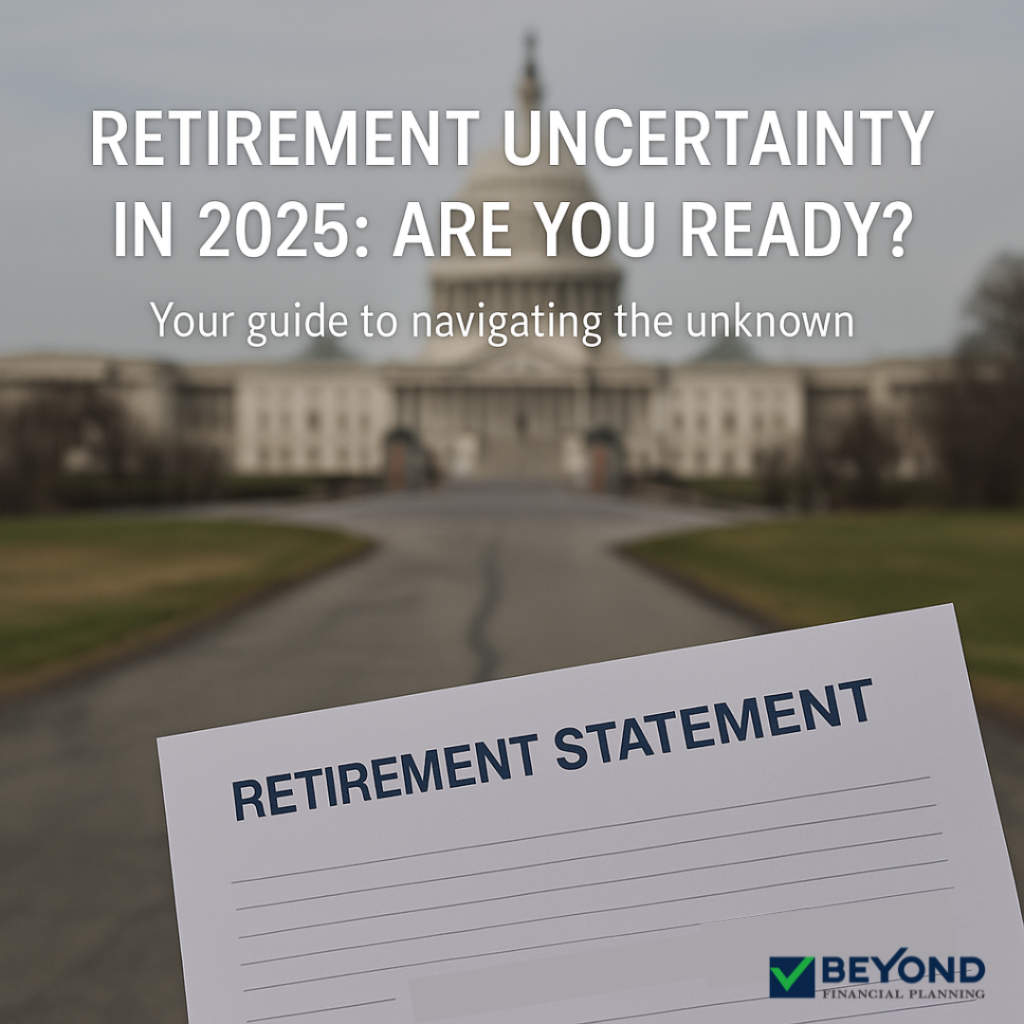
Retirement Uncertainty in 2025: How to Prepare for the Unknown
Your guide to navigating the unknown
Retirement is supposed to be a time of relaxation and enjoyment after years of hard work—but for many federal employees, uncertainty about the future is making it difficult to plan with confidence. A new administration, economic changes, and shifts in government policies have created concerns about financial stability and the ability to retire comfortably.
If you’re feeling uncertain about retirement, you’re not alone. Let’s dive into the key concerns facing federal employees and retirees in 2025 and explore how you can navigate them with confidence.
Table of Contents
- How a New Administration Could Impact Your Benefits
- Are You Mentally & Financially Ready to Retire?
- What the Department of Government Efficiency Could Mean for You
- Other Factors Increasing Retirement Uncertainty
- What You Can Do Right Now
- Feeling Overwhelmed? Let’s Talk.
1. The Impact of a New Administration
With every change in administration comes the possibility of new policies that affect federal benefits, pensions, and Social Security. While some administrations push for expanded benefits, others may prioritize cost-cutting measures that impact retirement security.
For example, past administrations have proposed adjustments to the Federal Employees Retirement System (FERS), including increases in employee contributions and changes to COLAs (Cost-of-Living Adjustments). These policy shifts can significantly affect how much you’ll have in retirement.
It’s important to stay informed about potential changes by checking resources like:
- Office of Personnel Management (OPM) – for updates on federal retirement policies.
- Thrift Savings Plan (TSP) – for any modifications to investment options and withdrawal rules.
- Social Security Administration (SSA) – for possible changes to benefits and eligibility.
What You Can Do:
Stay politically aware—some policy changes may require advocacy efforts from federal employees.Official TSP Website
Schedule a financial check-up with a professional who specializes in federal employee retirement planning, like Beyond Financial Planning.
Diversify your savings and not rely solely on government benefits.
2. Are You Mentally & Financially Ready to Retire?
Retirement is more than just a financial decision—it’s a lifestyle change that requires mental and emotional readiness. Many retirees struggle with transitioning from full-time work to a more flexible, unstructured lifestyle.
Signs You May Not Be Mentally Ready:
- You identify strongly with your job and worry about losing purpose.
- You haven’t planned for how you’ll spend your days, weeks, and years after retirement.
- You feel uncertain about whether you’ll have enough social interaction and fulfillment.
Financial Readiness:
- Do you know your monthly retirement budget?
- Have you accounted for rising healthcare costs?
- Have you explored your TSP withdrawal strategies?
At Beyond Financial Planning, we help federal employees map out their retirement income strategy to ensure they can retire comfortably without surprises. Our comprehensive approach ensures your pension, Social Security, and investments are aligned with your retirement goals.
3. The Role of the Department of Government Efficiency
The newly proposed Department of Government Efficiency (DGE) is aimed at reducing government waste and streamlining operations—but what does that mean for federal employees?
Potential outcomes could include:
- Early retirements and buyout offers (VSIPs) as the government seeks to reduce workforce size.
- Adjustments to retirement benefits, including modifications to FERS and CSRS pensions.
- Increased automation in government jobs leading to job reassignments or reductions.
While the full impact of this department is still unfolding, it’s important to prepare for potential changes that could affect your retirement timeline.
4. Additional Factors Causing Retirement Uncertainty
Beyond government policy changes, external economic factors also play a role in retirement planning:
Inflation & Market Volatility
- Inflation has a direct impact on the purchasing power of your retirement savings. While COLAs help offset inflation, they may not always keep pace with rising costs.
- Stock market fluctuations can impact the value of your TSP investments, requiring careful allocation and diversification.
Healthcare Costs & Long-Term Care
Planning for long-term care is becoming essential, especially since Medicare may not cover everything.
With medical expenses continuing to rise, many retirees find that FEHB (Federal Employees Health Benefits)premiums are a growing burden.
What Can You Do Right Now?
- Review your retirement plan with a financial professional to ensure you’re on track. At Beyond Financial Planning, we specialize in working with federal employees to help them transition into retirement smoothly.
- Monitor policy changes that could impact your pension, TSP, or Social Security. We stay on top of legislative updates so you don’t have to.
- Test your retirement budget by living off your expected post-retirement income for a few months before you retire.
- Consider phased retirement if you’re unsure about fully leaving the workforce. We can help you explore options like part-time consulting or phased retirement strategies.
Feeling Overwhelmed? Let’s Talk.
Retirement planning is complex, especially in uncertain times. At Beyond Financial Planning, we specialize in helping federal employees navigate the complexities of retirement.
👉 Schedule a free consultation today to get a personalized One Page Plan that ensures you retire with confidence.
📅 Book Your Free Consultation Today!
Disclosure
Beyond Financial Planning, LLC is a registered investment advisor. The information provided in this article is for educational purposes only and should not be considered personalized investment advice. For specific financial, tax, or legal guidance, please consult a qualified professional. Investing involves risks, including the potential loss of principal. For more information, please review our ADV Part 2A, ADV Part 2B, and Privacy Policy.
